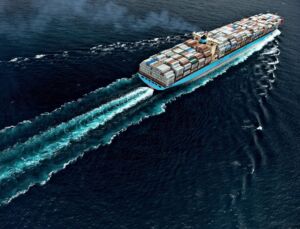News
Maersk eyeing climate-friendly benchmark
This article is more than 10 years old.
Better planning and slow-steaming has helped Maersk save big in recent years

Slow-streaming has helped Maersk save billions in fuel consumption (photo: Maersk)
Thanks to larger ships, better planning and lower speeds (via slow-streaming), Maersk Line has reduced its fuel consumption by almost 40 percent since 2007.
The Danish oil and shipping giant aims to further reduce its fuel consumption by 60 percent, compared to 2007, by 2020.
“I can’t say for certain that we will make it, but we’ll try our hardest,” Søren Toft, Maersk Line’s chief operating officer, told Politiken newspaper.
“Our reductions must occur as we grow in the market. We will reduce our fuel consumption in real figures and relatively per transported container. We don’t just do it because we want to be responsible, it also helps with the bottom line.”
READ MORE: Maersk terminal operator plotting a new course or two
Huge savings
In 2013 alone, Maersk saved about 4.3 billion kroner compared to the year before thanks to improved fuel consumption measures. In 2014, another 550 million kroner was shaved off fuel consumption expenses.
About 90 percent of all goods are transported by ships and the industry makes up about 3 percent of the global CO2 emissions.
“The transport sector is one of the most difficult areas to reduce CO2 emissions because you can’t just replace fuel with wind or sun energy,” Kirsten Halsnæs, a professor in climate and economics at the Technical University of Denmark, said.
“Meanwhile, there is more international trade, so it’s very commendable that they [Maersk] have set a target of reducing consumption by 60 percent. They will also save a lot of money doing so.”










































